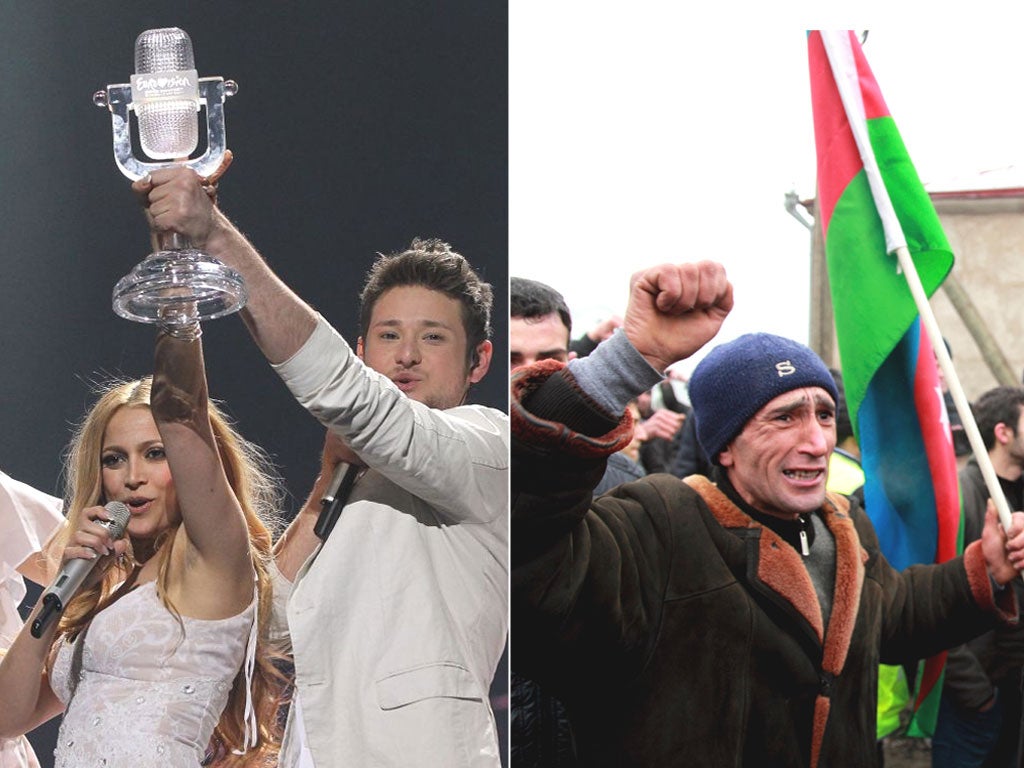Eurovision: light entertainment in a dark place
Britain's Eurovision bid is now in full flow, but the hosts remain out of tune with the contest's sunny image

It is seen by Britons as a celebration of kitsch – a harmless event which millions watch despite our chance of victory being close to nil. But for many citizens of this year's host country, Azerbaijan, the Eurovision Song Contest has brought misery as the government has forcibly evicted thousands from their homes in the run-up to the competition.
The BBC will today unveil the song that 75-year-old Englebert Humperdinck, pictured right, will sing at the event in May, at what could be the most controversial Eurovision since it was held in Franco's fascist Spain.
When Azerbaijan won the right to host Eurovision, the government of President Ilham Aliyev saw a chance to showcase the gas-rich country's burgeoning economy. Activists, meanwhile, were optimistic that such a high-profile event would pressure the authoritarian regime to address its abysmal human-rights record.
Now, rights groups say the situation has in fact got worse. A report released by Human Rights Watch (HRW) last month detailed how an ongoing "beautification" scheme for the capital Baku has led to thousands of people being forcibly evicted from their homes, often in contravention of court orders.
The story told by residents of 5 Agil Gurliyev Street is one example. The nine-storey tower block overlooks the Baku Crystal Hall Stadium, a 25,000-seat arena being built to host the contest. Many in the building were forced to leave with very little notice and without proper compensation, according to the HRW report. Those who stayed had electricity and gas cut. The building is now set to be torn down to make way for a "resort zone", to be used by visitors attending the competition.
The Aliyev government has denied the demolition has anything to do with Eurovision, and claims it was planned before the country won last year's contest. But the forced evictions are a small part of a much larger human-rights problem in Azerbaijan.
After his father Heydar died in 2003, President Aliyev brought in increasingly authoritarian measures. Backed by billions of dollars from the country's booming oil and gas sector, he has yet to win a fair election and has cracked down on opposition voices.
Inspired by events in the Arab Spring, last March opposition groups led a series of protests in Baku and other major cities against corruption, cronyism and the lack of democratic progress. Scores of people were arrested and imprisoned, including opposition politicians, journalists and bloggers. Human-rights groups estimate more than 60 people in Azerbaijani jails are political prisoners.
Late last year the Azerbaijani government had to assure the European Broadcasting Union (EBU) – the organisers of Eurovision – that freedom of speech would be guaranteed for all participants, delegates and visiting press. Critical Azeri bloggers and human-rights groups were quick to remark that the same privileges are not extended to them. "Azerbaijan will no doubt offer an opulent stage to voices from across Europe, but outside the concert hall, few critical voices are tolerated," said Amnesty International programme director John Dalhuisen.
While some are calling for a boycott of the competition, not all activists believe it is necessary. Instead, many hope that the media scrutiny which comes from hosting such an international event will help shine a spotlight on their plight. "I don't think a boycott will actually do much," explains Rasul Jafarov, a prominent human-rights campaigner who is part of a coalition of rights activists that has come together under the banner Sing for Democracy. "Instead what we want to see is journalists, politicians and those on the delegations look into what is happening in our country."
Others believe Eurovision should take a more critical line. Rachel Denber, deputy director of the Europe and Central Asia Division of Human Rights Watch, has called for the EBU to seek assurances from the Azerbaijani authorities that they will halt all further expropriations of property until they can be carried out in a transparent manner.
But the EBU is unlikely to become embroiled in the debate surrounding Azerbaijan's human-rights record. It has repeatedly stated Eurovision is a non-political event. A spokesman said last week that Eurovision "can act as an agent of change", adding that the EBU would be "disappointed" if more countries boycotted the event.
The BBC has so far remained tight-lipped about the controversy surrounding the host country.
A spokeswoman said yesterday that the BBC was aware of the forced evictions, and that representatives from the organisation would be meeting with the EBU in Baku to discuss it.
While no countries have expressed their intention to boycott in protest over the evictions, Azerbaijan's neighbour Armenia has withdrawn after President Aliyev described it as the "main enemy" of Azerbaijan.
Azerbaijan: rights abuses
November 2011
Azeri journalist Rafiq Tagi dies after being stabbed. Reports suggest the attack may have been in retaliation for an article criticising the Iranian government.
February 2012
Families are forcibly evicted from Baku to make way for the arena for the 2012 Eurovision Song Contest, according to Human Rights Watch.
March 2012
At least 17 protesters demonstrating peacefully in Baku are thrown in jail, says Amnesty International.
Subscribe to Independent Premium to bookmark this article
Want to bookmark your favourite articles and stories to read or reference later? Start your Independent Premium subscription today.

Join our commenting forum
Join thought-provoking conversations, follow other Independent readers and see their replies